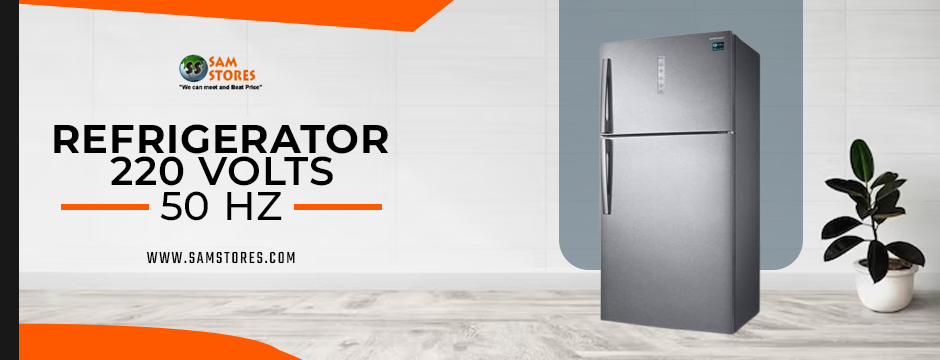Refrigerators are an indispensable appliance in any household or commercial establishment. They keep our food fresh, beverages chilled, and ensure the preservation of perishable items. However, selecting the right refrigerator can be a daunting task, especially when considering factors like voltage and frequency compatibility. In this guide, we’ll delve into the intricacies of choosing a refrigerator 220 volts 50 hz, catering to both residential and commercial needs.
Understanding 220 Volts 50 Hz Refrigerators:
Before delving into the selection process, it’s crucial to understand what distinguishes a 220 volts 50 Hz refrigerator from its counterparts. Unlike refrigerators designed for other voltages and frequencies, a 220 volts 50 Hz refrigerator is specifically engineered to operate efficiently in regions where the standard voltage is 220 volts and the frequency is 50 Hz. This specification is common in many parts of the world, including Europe, Asia, Africa, and Oceania. Therefore, if you reside or operate a business in such regions, opting for a 220 volts 50 Hz refrigerator is essential for optimal performance and energy efficiency.
Factors to Consider When Choosing:
Size and Capacity: Assess your spatial requirements and the volume of items you need to refrigerate regularly. Opt for a refrigerator size and capacity that aligns with your needs while considering factors like available space and storage requirements.
Energy Efficiency: Energy efficiency is paramount, especially in environments where electricity costs are high. Look for refrigerators with high Energy Star ratings or other energy efficiency certifications. These models are designed to consume less power while delivering optimal cooling performance, thus reducing your electricity bills in the long run.
Features and Functions: Evaluate the features and functions offered by different models. Consider aspects such as adjustable shelving, humidity control, ice and water dispensers, temperature control settings, and advanced cooling technologies like frost-free operation. Choose features that enhance convenience and suit your specific requirements.
Design and Aesthetics: Beyond functionality, consider the design and aesthetics of the refrigerator. Select a model that complements the overall decor of your home or business establishment. Whether you prefer a sleek stainless steel finish, a traditional white exterior, or custom paneling options, ensure that the refrigerator enhances the visual appeal of its surroundings.
Durability and Build Quality: Invest in a refrigerator with sturdy construction and durable components. Read customer reviews, seek recommendations, and research the reputation of different brands and models. A reliable refrigerator should withstand daily usage, resist wear and tear, and offer long-term durability without frequent repairs or maintenance.
Brand Reputation and Support: Opt for reputable brands known for their quality, reliability, and customer support. A well-established brand is more likely to offer warranty coverage, responsive customer service, and readily available spare parts. Prioritize brands with a proven track record in the refrigeration industry to ensure peace of mind and hassle-free ownership experience.
Price and Budget: Set a realistic budget based on your financial constraints and priorities. While it’s tempting to opt for the cheapest option available, prioritize value for money over upfront cost alone. Consider the long-term cost of ownership, including energy consumption, maintenance, and potential repairs. Compare prices across different brands and retailers to find the best deal without compromising on quality.
Compatibility and Voltage Requirements: Perhaps the most critical factor when choosing a refrigerator 220 volts 50 hz is ensuring compatibility with your electrical system. Verify that your home or business premises are equipped with a 220 volts 50 Hz power supply before making a purchase. Installing a refrigerator that operates on a different voltage or frequency can lead to performance issues, electrical hazards, and potential damage to the appliance.
Space and Installation Considerations: Measure the available space where you intend to place the refrigerator and ensure that the chosen model fits comfortably without obstructing walkways or interfering with other appliances. Additionally, consider factors like ventilation requirements, door swing clearance, and accessibility for maintenance and servicing when planning the installation.
Conclusion:
Choosing the right refrigerator 220 volts 50 hz requires careful consideration of various factors, including size, energy efficiency, features, design, durability, brand reputation, price, compatibility, and installation requirements. By assessing your needs and priorities and conducting thorough research, you can select a refrigerator that meets your requirements while ensuring optimal performance, energy efficiency, and longevity. Whether for your home or business, investing in the right refrigerator is essential for preserving food freshness, enhancing convenience, and optimizing energy consumption. Take the time to evaluate your options, seek expert advice if needed, and make an informed decision that aligns with your preferences and budget. With the right refrigerator in place, you can enjoy peace of mind knowing that your perishable items are stored safely and efficiently, whether it’s for daily household use or commercial operations.
